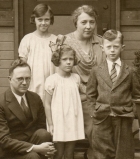The Strange Love of Peggy Covell

Peggy Covell had every right to hate the Japanese.
She grew up in Japan, where her parents served as missionary teachers in a middle school. In 1939 it became clear that the country was unstable and so, for their safety, the family was relocated to the Philippines. Peggy completed High School in Manila in 1940 and then returned to the United States to go to college. Her younger brother and sister came along, as her parents, Jim and Charma, wanted to keep all the children safe from the deteriorating political situation in Asia. Time would prove this to be a wise precaution.
Manila was captured by Japanese troops on January 2, 1942. Jim and Charma fled inland with the rest of their missionary team to a remote mountain hideout they christened “Hopevale.” For two years they lived peacefully among Filipino friends, and held worship services in a deep ravine they dubbed “The Cathedral in the Glen.” As many as 100 people attended their services, singing hymns, praying and listening to the missionaries teach in the beautiful forest.
All that ended on Sunday morning, December 19, 1943. Japanese soldiers captured Hopevale, and sentenced the missionaries to death. All of them, even the children, were to be executed the next day. On December 20th, the missionaries asked for time to pray together and read their Bibles. Then, one by one, still singing hymns, they were escorted up the mountain and beheaded. Their bodies were thrown into a hut and burned.
Peggy didn’t learn of her parent’s fate until after the war. And when she did hear, her hatred for the Japanese burned white-hot. Every day she struggled. Her hatred threatened to overwhelm her faith.
Then one day, she wondered, “Before my parents were slain, they asked for thirty minutes to pray to God. What was that prayer?”
Knowing her parents as she did, she was certain of the answer. Peggy was convinced that her parents had surely asked God to forgive their executioners. If her parents forgave them, how could Peggy do less?
I imagine that Peggy’s first day working at the Japanese internment camp in Colorado was a trade-off. She came to serve the prisoners to demonstrate forgiveness. And as she helped the men, she increased in her ability to forgive. In fact, her loving, gentle way of nursing and conscientious care for the men as a volunteer at the camp touched even the hardest hearts.
“Why do you do this?” they asked, and her gentle reply was, “Because the Japanese army killed my parents. But the Holy Spirit has washed away my hatred and has replaced it with love.”
The men could not fathom such love, and were haunted by her story even after returning to Japan. The story of Peggy’s forgiveness was told over and over.
One former prisoner told the story to Mitsuo Fuchida, the Japanese national hero who led the air raid on Pearl Harbor. Peggy’s story motivated Fuchida to search the Bible to find the source of her strange love. He found forgiveness in Christ. Later, when Fuchida became an evangelist, he told Peggy’s story all over Japan, inviting his conquered people to the grace he had found.
It was exactly what Peggy’s parents would have wanted.

